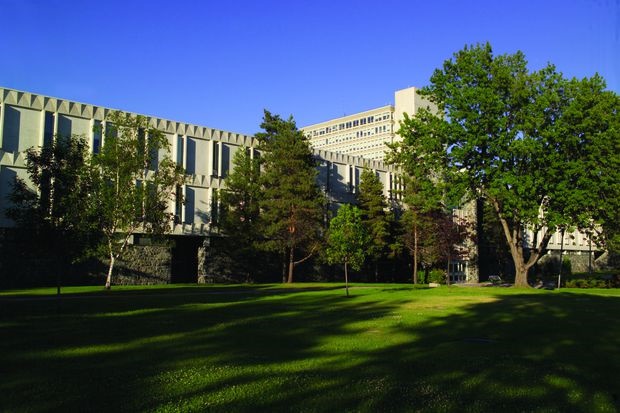Laurentian University is suspending admissions to 17 programs as it grapples with a deficit and the implications of the COVID-19 pandemic for postsecondary institutions.
The programs no longer accepting students include anthropology, archeology, geography and a host of others from business to music, languages and mathematics. Many are in French, which may limit the options of the roughly 20 per cent of the university’s 6,000 students who are francophone.
The suspension means new students will not be admitted to those programs, but the university said returning students will be able to complete their courses. The 17 programs have had low enrolment in recent years, according to Laurentian president Robert Haché. He said only 49 students are currently enrolled across all 17.
Laurentian, located in Sudbury, was among the first Canadian universities to warn that the pandemic and the risk of an enrolment drop posed a threat to institutional viability. It’s in a region with a smaller university-aged population and is among the schools most threatened financially by the pandemic.
But Mr. Haché said the decision to suspend these programs was not primarily driven by COVID-19.
“There’s a natural cycle of academic renewal that happens at universities over time. These programs have been low-enrolment programs for a number of years,” Mr. Haché said.
“We’re trying to have programs that are attractive to our students and have market demand. If they have chronically low enrolment then that’s not the case.”
Mr. Haché said the students already accepted into those programs for the coming year will now be offered alternatives. In some cases, courses in certain disciplines will still be available, but the degree specialization will not. Students may still take a degree that would require a smaller number of credits in that discipline.
Laurentian’s faculty association is fighting the move and is seeking a judicial review. It says only the university senate, not the administration, can make such decisions.
“We want the court to order the university to rescind the decision and consult with the university senate,” said Jean-Charles Cachon, a professor of marketing and management and secretary-treasurer of the faculty association. In the long term, he added, the university needs to address its financial situation. Already there have been layoffs, a reduction in contract staff and a hiring freeze.
The university said it expected a shortfall of $15-million in 2020-21, which it called an “urgent financial crisis” made worse by the pandemic. The university, like many institutions, has been anticipating a potential loss of tuition revenue, particularly from international students, who contribute more than half of all tuition revenue at Canadian universities.
Mr. Haché said so far enrolment has been better than expected, with a 2-per-cent increase in confirmations among domestic students. But confirmations from international students, beset by travel restrictions, are down nearly 10 per cent, and many who have confirmed have deferred their arrival until next year.
The suspension of programs will not save much in the short term, Mr. Haché said. But it makes room for new programs and plays an important role in deciding which faculties will hire full-time staff.
Stephen Meyer, a geographer and director of the school of northern and community studies, said some disciplines may attract few students as majors, but they produce useful and popular electives.
“As soon as you’re on this list it’s dead department walking. You have a heck of a time recruiting students,” Prof. Meyer said. “If all that matters is the number of people taking a major I think that’s a really narrow view and other disciplines will suffer for it.”
Eric Chappell, president of the Laurentian students’ association, said the changes were handed down suddenly and caught many at the university off guard. The university’s budget problems are well known, but Mr. Chappell said he doesn’t want to see the students’ educational options suffer.
“As much as this is undesirable, there’s going to a lot of tough decisions with COVID,” Mr. Chappell said.
JOE FRIESEN
POSTSECONDARY EDUCATION REPORTER
The Globe and Mail, August 24, 2020

